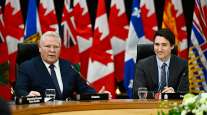US Weighs More Tariffs on Chinese Goods, Including EVs

[Stay on top of transportation news: Get TTNews in your inbox.]
President Joe Biden’s administration is weighing a tariff increase on Chinese electric vehicles and other goods in an effort to make U.S. clean-energy products more competitive, according to people familiar with the matter.
Officials from the White House and various Cabinet agencies have been discussing whether to hike duties on certain Chinese exports, the people said. The talks are part of yearslong deliberations that began shortly after Biden took office.
Some in the administration would like the debate to conclude early next year, according to the people, who spoke on condition of anonymity to describe private deliberations.
The Wall Street Journal reported earlier on the discussions.
Spokespeople for the White House National Security Council and the Treasury Department declined to comment on the ongoing review. The office of the U.S. Trade Representative didn’t respond to a request for comment.
Biden left in place tariffs on around $300 billion on Chinese goods imposed by former President Donald Trump. Biden’s administration launched a review of the tariffs nearly three years ago, but internal divisions have prevented his team from arriving at a consensus on tariff policy.
Want more news? Listen to today's daily briefing above or go here for more info
Tariff levels have remained unchanged as Biden pursued a thaw in U.S.-China relations with President Xi Jinping, culminating in a meeting last month outside San Francisco in which they agreed to curb illicit fentanyl trafficking and restore military-to-military communications.
Raising tariffs further on Chinese electric vehicles could have a minimal impact on the U.S. market. The vehicles are already subject to a 25% duty, which has hampered Chinese companies from making inroads with American consumers.
In a sign of increasing competition on clean energy, China on Dec. 21 announced a fresh export ban on rare-earth mineral processing technology. That move could make it harder for the U.S. and its allies to increase supply of raw materials needed for batteries and other technology.




